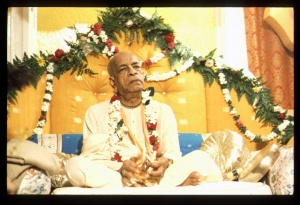SB 1.7.4: Difference between revisions
No edit summary |
(Vanibot #0054 edit - transform synonyms into clickable links, which search similar occurrences) |
||
| Line 24: | Line 24: | ||
<div class="synonyms"> | <div class="synonyms"> | ||
''bhakti'' | ''[//vanipedia.org/wiki/Special:VaniSearch?s=bhakti&tab=syno_o&ds=1 bhakti]'' — devotional service; ''[//vanipedia.org/wiki/Special:VaniSearch?s=yogena&tab=syno_o&ds=1 yogena]'' — by the process of linking up; ''[//vanipedia.org/wiki/Special:VaniSearch?s=manasi&tab=syno_o&ds=1 manasi]'' — upon the mind; ''[//vanipedia.org/wiki/Special:VaniSearch?s=samyak&tab=syno_o&ds=1 samyak]'' — perfectly; ''[//vanipedia.org/wiki/Special:VaniSearch?s=praṇihite&tab=syno_o&ds=1 praṇihite]'' — engaged in and fixed upon; ''[//vanipedia.org/wiki/Special:VaniSearch?s=amale&tab=syno_o&ds=1 amale]'' — without any matter; ''[//vanipedia.org/wiki/Special:VaniSearch?s=apaśyat&tab=syno_o&ds=1 apaśyat]'' — saw; ''[//vanipedia.org/wiki/Special:VaniSearch?s=puruṣam&tab=syno_o&ds=1 puruṣam]'' — the Personality of Godhead; ''[//vanipedia.org/wiki/Special:VaniSearch?s=pūrṇam&tab=syno_o&ds=1 pūrṇam]'' — absolute; ''[//vanipedia.org/wiki/Special:VaniSearch?s=māyām&tab=syno_o&ds=1 māyām]'' — energy; ''[//vanipedia.org/wiki/Special:VaniSearch?s=ca&tab=syno_o&ds=1 ca]'' — also; ''[//vanipedia.org/wiki/Special:VaniSearch?s=tat&tab=syno_o&ds=1 tat]'' — His; ''[//vanipedia.org/wiki/Special:VaniSearch?s=apāśrayam&tab=syno_o&ds=1 apāśrayam]'' — under full control. | ||
</div> | </div> | ||
Latest revision as of 18:13, 17 February 2024

A.C. Bhaktivedanta Swami Prabhupada
TEXT 4
- bhakti-yogena manasi
- samyak praṇihite 'male
- apaśyat puruṣaṁ pūrṇaṁ
- māyāṁ ca tad-apāśrayam
SYNONYMS
bhakti — devotional service; yogena — by the process of linking up; manasi — upon the mind; samyak — perfectly; praṇihite — engaged in and fixed upon; amale — without any matter; apaśyat — saw; puruṣam — the Personality of Godhead; pūrṇam — absolute; māyām — energy; ca — also; tat — His; apāśrayam — under full control.
TRANSLATION
Thus he fixed his mind, perfectly engaging it by linking it in devotional service [bhakti-yoga] without any tinge of materialism, and thus he saw the Absolute Personality of Godhead along with His external energy, which was under full control.
PURPORT
Perfect vision of the Absolute Truth is possible only by the linking process of devotional service. This is also confirmed in the Bhagavad-gītā. One can perfectly realize the Absolute Truth Personality of Godhead only by the process of devotional service, and one can enter into the kingdom of God by such perfect knowledge. Imperfect realization of the Absolute by the partial approach of the impersonal Brahman or localized Paramātmā does not permit anyone to enter into the kingdom of God. Śrī Nārada advised Śrīla Vyāsadeva to become absorbed in transcendental meditation on the Personality of Godhead and His activities. Śrīla Vyāsadeva did not take notice of the effulgence of Brahman because that is not absolute vision. The absolute vision is the Personality of Godhead, as it is confirmed in the Bhagavad-gītā (BG 7.19): vāsudevaḥ sarvam iti. In the Upaniṣads also it is confirmed that Vāsudeva, the Personality of Godhead, is covered by the golden glowing hiraṇmayena pātreṇa veil of impersonal Brahman, and when that curtain is removed by the mercy of the Lord the real face of the Absolute is seen. The Absolute is mentioned here as the puruṣa, or person. The Absolute Personality of Godhead is mentioned in so many Vedic literatures, and in the Bhagavad-gītā, the puruṣa is confirmed as the eternal and original person. The Absolute Personality of Godhead is the perfect person. The Supreme Person has manifold energies, out of which the internal, external and marginal energies are specifically important. The energy mentioned here is the external energy, as will be clear from the statements of her activities. The internal energy is there along with the Absolute Person as the moonlight is there with the moon. The external energy is compared to darkness because it keeps the living entities in the darkness of ignorance. The word apāśrayam suggests that this energy of the Lord is under full control. The internal potency or superior energy is also called māyā, but it is spiritual māyā, or energy exhibited in the absolute realm. When one is under the shelter of this internal potency, the darkness of material ignorance is at once dissipated. And even those who are ātmārāma, or fixed in trance, take shelter of this māyā, or internal energy. Devotional service, or bhakti-yoga, is the function of the internal energy; thus there is no place for the inferior energy, or material energy, just as there is no place for darkness in the effulgence of spiritual light. Such internal energy is even superior to the spiritual bliss attainable in the conception of impersonal Brahman. It is stated in the Bhagavad-gītā that the impersonal Brahman effulgence is also an emanation from the Absolute Personality of Godhead Śrī Kṛṣṇa. The parama-puruṣa cannot be anyone except Śrī Kṛṣṇa Himself, as will be explained in the later ślokas.